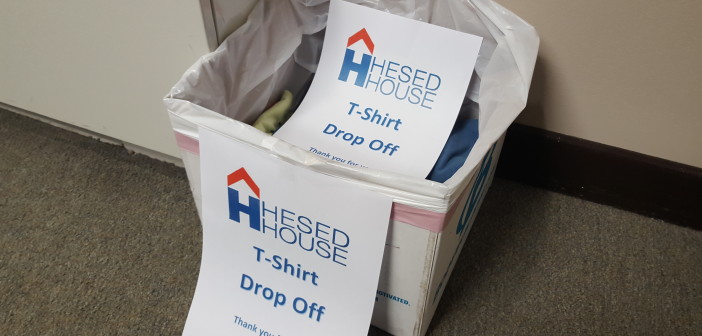How will you give back to the community? North Central College student Francesca Lenzi (’16) and her group of students came together to collect 80 T-shirts for the Hesed House in Aurora, Ill. This is an entry-level side project for the course Protest and Change taught by Dr. Jennifer Keys, professor of sociology.
“This project is based on community engaged learning pedagogy, which seeks to combine theory and praxis,” Keys said. “It reflects a broader initiative on campus that is really gaining momentum.”
In this course, the students are learning about social movements and social change, but this project is geared toward service learning, so by actually going out into the world they are learning something about how social change can really impact individuals who are less fortunate.
“I hope that the small impact from our small class reassures the people at Hesed House that people do care about their well being and that they do not have to feel ashamed of being homeless,” said Sundae Saine (’17), junior. “At any time that could be any of us and our family.”
The class is split up into taskforces, which are essentially little groups of five or six people, and then they can decide what fundraiser they would like to do or what way they can make a difference in the community.
“I think it important as a North Central student that we can reach out to different organizations and it can be something as simple as a T-shirt drive,” Lenzi said. “I always keep in my mind of what we can be doing on campus, even if it is small, to help other organizations.”
Lenzi’s group decided that they would try and collect T-shirts from different organizations at North Central College. This idea started with Lenzi because she had interned at DuPagePads, which is an organization that helps the homeless just like the Hesed House. She had come up with this idea for them, so she decided to use the same idea for this project with the Hesed House.
The Hesed House is the second largest shelter in Illinois, and the largest shelter outside the City of Chicago. It was founded in the early 1980s by a group of religious leaders from six churches in Aurora and other concerned community members who formed a coalition to shelter, feed, and clothe homeless individuals and families found living on the streets. Each night the group of religious leaders would rotate among the six churches to house and feed the homeless.
After a while of constant rotation, the coalition decided to approach the City of Aurora leaders to discuss a better solution for housing, feeding and clothing these homeless individuals. A former incinerator building was available for sale and became the home for the homeless; therefore, the establishment of the Hesed House.
The first step Lenzi’s group took was looking at the list of needs that the Hesed House had and the first one listed was T-shirts. A box was placed in Kiekhofer Hall where people could drop off their unwanted T-shirts to donate to the Hesed House. The group has already collected 40 T-shirts from the LEV organization and a couple here and their from other organizations, so because of the large donation from LEV, the group decided their goal would be to collect 80 T-shirts by Thursday, Feb. 25 for the homeless at Hesed.
“We could have done something as simple as a food drive, but the unique approach was a different way of learning,” Lenzi said.
A lot of organizations like DuPagePads and the Hesed House have other organizations that come in and donate clothing, but the donations may not always be consistent.
“The T-shirts are essential because it’s a backdrop, meaning if they don’t have donations coming in with clothing, they can then fall back on their overflow of T-shirts,” Lenzi said.
In order to become advocates and activists for social change this group of students must be able to identify, analyze, and critically evaluate the root causes of social problems and conflicts. The first step toward achieving this goal is to immerse themselves in the research on social movements. The next step is to connect what they are learning with what is happening in the community and world around them.
“There is always needs out there,” Lenzi said. “But we get so caught up in our studies, and by being able to go out and just try different organizations and get our volunteer work, even if it is a one-time event, it makes you realize what your true passions are and where you can help.”

